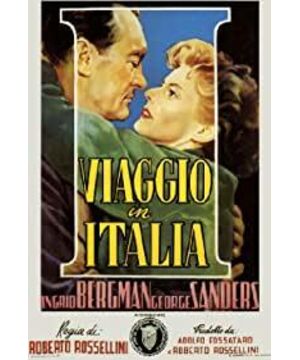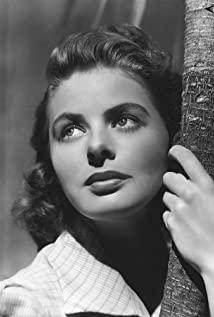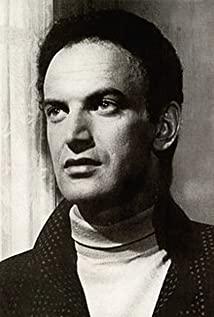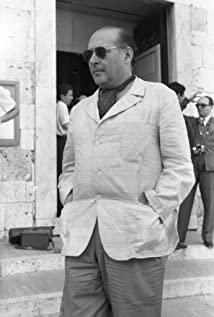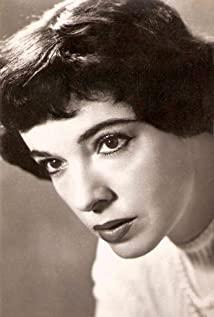Letter on Rossellini Jacques Rivette Translated by Tom Milne.
'Ordinance protects. Order reigns.'
You don't think much of Rossellini; you don't, so you tell me, like Voyage to Italy ; and everything seems to be in order. But no; you are not assured enough in your rejection not to sound out the opinion of Rossellinians. They provoke you, worry you, as if you weren't quite easy in your mind about your taste. What a curious attitude!
But enough of this bantering tone. Yes, I have a very special admiration for Rossellini's latest film (or rather, the latest to be released here). On what grounds? Ah, that's where it gets more difficult. I cannot invoke exaltation, emotion , joy: these are terms you will scarcely admit as evidence; but at least you will, I trust, understand them. (If not, may God help you.)
To gratify you, let us change the tone yet again. Mastery, freedom, these are words you can accept; for what we have here is the film in which Rossellini affirms his mastery most clearly, and, as in all art, through the free exercise of his talents; I shall come back to this later. First I have something to say which should be of greater concern to you: if there is a modern cinema, this is it. But you still require evidence.
- If I consider Rossellini to be the most modern of film-makers, it is not without reason; nor is it through reason, either. It seems to me impossible to see Voyage to Italy without receiving direct evidence of the fact that the film opens a breach, and that all cinema, on pain of death, must pass through it. (Yes, that there is now no other hope of salvation for our miserable French cinema but a healthy transfusion of this young blood.) This is, of course, only a personal impression. And I should like forthwith to forestall a misunderstanding: for there are other films, other film-makers doubtless no less great than this; though less, how shall I put it, exemplary. I mean that having reached this point in their careers, their creation seems to close in on itself, what they do is of importance for, and within the perspectives of, this creation. Here, undoubtedly, is the culmination of art, no longer answerable to anyone but itself and, once the experimental fumblings and explorations are past, discouraging disciples by isolating the masters: their domain dies with them, along with the laws and the methods current there. Renoir, Hawks, Lang belong here, of course, and in a certain sense, Hitchcock. Le Carrosse d'Ormay inspire muddled copies, but never a school; only presumption and ignorance make these copies possible, and the real secrets are so well hidden within the series of Chinese boxes that to unravel them would probably take as many years as Renoir's career now stretches to; they merge with the various mutations and developments undergone over thirty years by an exceptionally keen and exacting creative intelligence. In its energy and dash, the work of youth or early maturity remains a reflection of the movements of everyday life; animated by a different current, it is shackled to time and can detach itself only with difficulty. But the secret of Le Carrosse d'Oris that of creation and the problems, the trials, the gambles it subjects itself to in order to perfect an object and give it the autonomy and the subtlety of an as yet unexplored world. What example is there, unless that of discreet, patient work which finally effaces all traces of its passage? But what could painters or musicians ever retain from the later works of Poussin or Picasso, Mozart or Stravinsky -- except a salutary despair. There is reason to think that in a decade or so Rossellini too will attain (and acclimatise himself to) this degree of purity; he has not reached it yet -- luckily, it may be said; there is still time to follow him before within him in his turn eternity . . . (1) ; while the man of action still lives in the artist.
- Modern, I said; after a few minutes watching Voyage to Italy, for instance, a name kept recurring in my mind which seems out of place here: Matisse. Each image, each movement, confirmed for me the secret affinity between the painter and the film-maker. This is simpler to state than to demonstrate; I mean to try, however, though I fear that my main reasons may seem rather frivolous to you, and the rest either obscure or specious. All you need do, to start with, is look: note, throughout the first part, the predilection for large white surfaces, judiciously set off by a neat trait, an almost decorative detail; if the house is new and absolutely modem in appearance, this is of course because Rossellini is particularly attracted to contemporary things, to the most recent forms of our environment and customs; and also because it delights him visually. This may seem surprising on the part of arealist (and even neo-realist); for heaven's sake, why? Matisse, in my book, is a realist too: the harmonious arrangement of fluid matter, the attraction of the white page pregnant with a single sign, of virgin sands awaiting the invention of the precise trait, all this suggests to me a more genuine realism than the overstatements, the affectations, the pseudo-Russian conventionalism of Miracle in Milan ; all this, far from muffling the film-maker's voice, gives him a new, contemporary tone that speaks to us through our freshest, most vital sensibility; all this affects the modem man in us, and in fact bears witness to the period as faithfully as the narrative does; all this in fact deals with the honnete homme of 1953 or 1954 ; this, in fact, is the theme.
- On the canvas, a spontaneous curve circumscribes, without ever pinning down, the most brilliant of colors; a broken line, nevertheless unique, encompasses matter that is miraculously alive, as though transferred intact from its source. On the screen, a long parabola, pliant and precise, guides and controls each sequence, then punctually closes again. Think of any Rossellini film: each scene, each episode will recur in your memory not as a succession of shots and compositions, a more or less harmonious succession of more or less brilliant images, but as a vast melodic phrase, a continuous arabesque, a single implacable line which leads people ineluctably towards the as yet unknown, embracing in its trajectory a palpitant and definitive universe; whether it be a fragment from Paisa , afioretto from The Flowers of St Francis , a 'station' in Europa '51 , or these films in their entirety, the symphony in three movements of Germany, Year Zero , the doggedly ascending scale of The Miracle or Stromboli (musical metaphors come as spontaneously as visual ones) -- the indefatigable eye of the camera invariably assumes the role of the pencil, a temporal sketch is perpetuated before our eyes (but rest assured, without attempts to instruct us by using slow motion to analyze the Master's inspiration for our benefit ) (2); we live through its progress until the final shading off, until it loses itself in the continuance of time just as it had loomed out of the whiteness of the canvas. For there are films which begin and end, which have a beginning and an ending , which conduct a story through from its initial premise until everything has been restored to peace and order, and there have been deaths, a marriage or a revelation; there is Hawks, Hitchcock, Murnau, Ray, Griffith. And there are the films quite unlike this, which recede into time like rivers to the sea; and which offer us only the most banal of closing images: rivers flowing, crowds, armies, shadows passing, curtains falling in perpetuity, a girl dancing till the end of time; there is Renoir and Rossellini. It is then up to us, in silence, to prolong this movement that has returned to secrecy,this hidden arc that has buried itself beneath the earth again; we have not finished with it yet. (Of course all this is arbitrary, and you are right: the first group prolongs themselves too, but not quite in the same way, it seems to me; they gratify the mind, their eddies buoy us up, whereas the others burden us, weigh us down. That is what I meant to say.) And there are the films that rejoin time through a painfully maintained immobility; that expend themselves without flinching in a perilous position on summits that seem uninhabitable; such asweigh us down. That is what I meant to say.) And there are the films that rejoin time through a painfully maintained immobility; that expend themselves without flinching in a perilous position on summits that seem uninhabitable; such asweigh us down. That is what I meant to say.) And there are the films that rejoin time through a painfully maintained immobility; that expend themselves without flinching in a perilous position on summits that seem uninhabitable; such asThe Miracle , Europa '51 .
- Is it toon soon for such enthusiasms? A little too soon, I fear; so let us return to earth and, since you wish it, talk of compositions: but this lack of balance, this divergence from the customary centres of gravity, this apparent uncertainty which secretly shocks you so deeply, forgive me if once again I see the head of Matisse here, his asymmetrism, the magisterial 'falseness' in composition, tranquilly eccentric, which also shocks at first glance and only subsequently reveals its secret equilibrium where values are as important as the lines, and which gives to each canvas this unobtrusive movement, just as here it yields at each moment this controlled dynamism, this profound inclination of all elements, all arcs and volumes at that instant, towards the new equilibrium,and in the following second of the new disequilibrium towards the next; and this might be learned as the art of succession in composition (or rather, of successive composition) which, unlike all the static experiments that have been stifling the cinema for thirty years , seems to me to stand to reason as the only visual device legitimate for the film-maker.
- I shall not labor the point further: any comparison soon becomes irksome, and I fear that this one has already continued too long; in any case, who will be convinced except those who see the point as soon as it is stated? But allow me just one last remark -- concerning the Trait: grace and gaucheness indissolubly linked. Render tribute in either case to a youthful grace, impetuous and stiff, clumsy and yet disconcertingly at ease, that seems to me to be in the very nature of adolescence, the awkward age, where the most overwhelming, the most effectiveMatisse and Rossellini affirm the freedom of the artist, but do not misunderstand me: a controlled, constructed freedom, where the initial building finally disappears beneath the sketch . For this trait must be added which will resume all the rest: the common sense of the draft. A sketch more accurate, more detailed than any detail and the most scrupulous design, a disposition of forces more accurate than composition, these are the sort of miracles from which springs the sovereign truth of the imagination, of the governing idea which only has to put in an appearance to assume control, summarily outlined in broad essential strokes, clumsy and hurried yet epitomizing twenty fully rounded studies. For there is no doubt that these hurried films,improvised out of very slender means and filmed in a turmoil that is often apparent from the images, contain the only real portrait of our times; and these times are a draft too. How could one fail suddenly to recognize, quintessentially sketched, ill-composed , incomplete, the semblance of our daily existence? These arbitrary groups, these absolutely theoretical collections of people eaten away by lassitude and boredom, exactly as we know them to be, as the irrefutable, accusing image of our heteroclite, dissident, discordant societies.the semblance of our daily existence? These arbitrary groups, these absolutely theoretical collections of people eaten away by lassitude and boredom, exactly as we know them to be, as the irrefutable, accusing image of our heteroclite, dissident, discordant societies.the semblance of our daily existence? These arbitrary groups, these absolutely theoretical collections of people eaten away by lassitude and boredom, exactly as we know them to be, as the irrefutable, accusing image of our heteroclite, dissident, discordant societies. Europa '51 , Germany, Year Zero , and this film which might be called Italy '53 , just as Paisa was Italy '44 , these are our mirror, scarcely flattering to us; let us yet hope that these times, true in their turn like these kindred films, will secretly orient themselves towards an inner order, towards a truth which will give them meaning and in the end justify so much disorder and flurried confusion.
- Ah, now there is cause for misgivings: the author is showing the cloven hoof. I can hear the mutters already: coterie talk, fanaticism, intolerance. But this famous freedom, and much vaunted freedom of expression, but more particularly the freedom to express everything of oneself, who carries it further? -- To the point of immodesty, comes the answering cry; for the strange thing is that people still complain, and precisely those people who are loudest in their claims for freedom (to what end? the liberation of man? I'll buy that, but from what chains? That man is free is what we are taught in the catechism, and what Rossellini quite simply shows; and his cynicism is the cynicism of great art). ' Voyage to Italyis the Essays of Montaigne,' our friend M preettily says; this, it seems, is not a compliment; permit me to think otherwise, and to wonder at the fact that our era, which can no longer be shocked by anything, should pretend to be scandalized because a film-maker dares to talk about himself without restraint; it is true that Rossellini's films have more and more obviously become amateur films; home movies; Joan of Arc at the Stake is not a cinematic transposition of the celebrated oratorio, but simply a souvenir film of his wife's performance in it just as The Human Voice was primarily the record of a performance by Anna Magnani (the most curious thing is that Joan of Arc at the Stake , like The Human Voice , is a realfilm, not in the least theatrical in its appeal; but this would lead us into deep waters). Similarly, Rossellini's episode in We the Women is simply the account of a day in Ingrid Bergman's life; while Voyage to Italy presents a transparent fable, and George Sanders a face barely masking that of the film-maker himself (a trifle tarnished, no doubt, but that is humility), -- Now he is no longer filming just his ideas, as in Stromboli or Europa '51, but the most everyday details of his life; this life, however, is 'exemplary' in the fullest sense that Goethe implied: that everything in it is instructive, including the errors; and the account of a busy afternoon in Mrs. Rossellini's life is no more frivolous in this context than the long description Eckermann gives us of that beautiful day, on May 1st 1825, when he and Goethe practiced archery together. -- So there, then, you have this country, this city; but a privileged country, an exceptional city, retaining intact innocence and faith, living squarely in the eternal; a providentialcity; and here, by the same token, is Rossellini's secret, which is to move with unremitting freedom, and one single, simple motion, through manifest eternity: the world of the incarnation; but that Rossellini's genius is possible only within Christianity is a point I shall not labor, since Maurice Scherer' has already argued it better than I could ever hope to do, in a magazine: Les Cahiers du Cinema , if I remember right. (3)
- Such freedom, absolute, inordinate, whose extreme license never involves the sacrifice of inner rigor, is freedom won; or better yet, earned. This notion of earning is quite new, I fear, and astonishing even though evident; so the next thing is , earned how? -- By virtue of meditation, of exploring an idea or an inner harmony; by virtue of sowing this predestined seed in the concrete world which is also the intellectual world ('which is the same as the spiritual world'); by virtue of persistence, which then justifies any surrender to the hazards of creation, and even urges our hapless creator to such surrender; once again the idea becomes flesh, the work of art, the truth to come, becomes the very life of the artist , who can thereafter no longer do anything that steers clear of this pole, this magnetic point. -- And thereafter we too,I fear, can barely leave this inner circle any more, this basic refrain that is reprised chorally: that the body is the soul, the other is myself, the object is the truth and the message; and now we are also trapped by this place where the passage from one shot to the next is perpetual and infinitely reciprocal; where Matisse's arabesques are not just invisibly linked to their hearth, do not merelyrepresent it, but are the fire itself.
- This position offers strange rewards; but grant me another detour, which like all detours will have the advantage of getting us more quickly to where I want to take you. (It is becoming obvious anyway that I am not trying to follow a coherent line of argument, but rather that I am bent on repeating the same thing in different ways; affirming it on different keyboards.) I have already spoken of Rossellini's eye, his look; I think I even made a rather hasty comparison with Matisse's tenacious pencil; it doesn't matter, one cannot stress the film-maker's eye too highly (and who can doubt that this is where his genius primarily lies?), and above all its singularity. Ah, I'm not really talking about Kino-Eye, about documentary objectivity and all that jazz; I'd like to have you feel (with your finger) more tangibly the powersof this look: which may not be the most subtle, which is Renoir, or the most acute, which is Hitchcock, but is the most active; and the point is not that it is concerned with some transfiguration of appearances, like Welles, or their condensation, like Murnau, but with their capture: a hunt for each and every moment, at each perilousmoment a corporeal quest (and therefore a spiritual one; a quest for the spirit by the body), an incessant movement of seizure and pursuit which bestows on the images some indefinable quality at once of triumph and agitation: the very note, indeed, of conquest. -- (But perceive, I beg you, wherein the difference lies here; this is not some pagan conquest, the exploits of some infidel general; do you perceive the fraternal quality in this word, and what sort of conquest is implied, what it comprises of humility, of charity?)
- For 'I have made a discovery': there is a television aesthetic; don't laugh, that isn't my discovery, of course; and what this aesthetic is (what it is beginning to be) I learned just recently from an article by Andre Bazin (4) which, like me, you read in the colored issue of Cahiers du Cinema (definitely an excellent magazine). But this is what I realized: that Rossellini's films, though film, are also subject to this direct aesthetic, with all it comprises of gamble, tension, chance and providence (which in fact chiefly explains the mystery of Joan of Arc at the Stake, where each shot change seems to take the same risks, and induce the same anxiety, as each camera change). So there we are, because of a film this time, ensconced in the darkness, holding our breath, eyes riveted to the screen which is at last granting us such privileges: spying on our neighbor with the most appalling indiscretion, violating with impunity the physical intimacy of people who are quite unaware of being exposed to our fascinated gaze; and in consequence, to the imminent rape of their souls . But in just punishment, we must instantly suffer the anguish of anticipating, of prejudging what must come after; what weight time suddenly lends to each gesture; one does not know what is going to happen, when, how; one has a presentiment of the event, but without seeing it take shape; everything here is fortuitous, instantly inevitable; even the sense of hereafter , within the impassive web of duration. So, you say, the films of a voyeur? -- or a seer.
- Here we have a dangerous word, which has been made to mean a good many silly things, and which I don't much like using; again you're going to need a definition. But what else can one call this faculty of seeing through beings and things to the soul or the ideal they carry within them, this privilege of reaching through appearances to the doubles which engender them? (Is Rossellini a Platonist? -- Why not, after all he was thinking of filming Socrates .) Because as the screening went on, after an hour went by I wasn't thinking of Matisse any more, I'm afraid, but of Goethe: the art of associating the idea with the substance first of all in the mind, of blending it with its objectby virtue of meditation; but he who speaks aloud of the object, through it instantly names the idea. Several conditions are necessary, of course: and not just this vital concentration, this intimate mortification of reality, which are the artist's secret and to which we have no access; and which are none of our business anyway. There is also the precision in the presentation of this object, secretly impregnated; the lucidity and the candor (Goethe's celebrated 'objective description'). This is not yet enough; this is where ordering comes into play, no, order itself, the heart of creation, the creator's design; what is modestly known in professional terms as the construction (and which has nothing to do with the assembling of shots currently in vogue; it obeys different laws); that order, in other words, which,giving precedence to each appearance according to merit, within the illusion that they are simply succeeding one another, forces the mind to conceive another law than chance for their judicious advent. This is something narrative has known, in film or novel, since it grew up . Novelists and film-makers of long standing, Stendhal and Renoir, Hawks and Balzac, know how to make construction the secret element in their work. Yet the cinema turned its back on the essay (I employ AM 'sknow how to make construction the secret element in their work. Yet the cinema turned its back on the essay (I employ AM 'sknow how to make construction the secret element in their work. Yet the cinema turned its back on the essay (I employ AM 's(5) word), and repudiated its unfortunate guerrillas, Intolerance , La Regle du Jeu , Citizen Kane . There was The River , the first didactic poem: now there is Voyage to Italy which, with absolute lucidity, at last offers the cinema, hitherto condemned to narrative, the possibility of the essay.
- For over fifty years now the essay has been the very language of modern art; it is freedom, concern, exploration, spontaneity; it has gradually -- Gide, Proust, Valery, Chardonne, Audiberti -- buried the novel beneath it; since Manet and Degas it has reigned over painting, and gives it its impassioned manner, the sense of pursuit and proximity. -- But do you remember that rather appealing group some years ago which had chosen some number or other as their objective and never stopped clamouring for the 'liberation' of the cinema; (6)don't worry, for once it had nothing to do with the advancement of man; they simply wanted the Seventh Art to enjoy a little of that more rarefied air in which its elders were flourishing; a very proper feeling lay behind it all. It appears, however, that some of the survivors don't care at all for Voyage to Italy ; this seems incredible. For here is a film that comprises almost everything they prayed for: metaphysical essay, confession, log-book, intimate journal -- and they failed to realize it. This is an edifying story , and I wanted to tell you the whole of it.
- I can see only one reason for this; I fear I may be being malicious (but maliciousness, it seems, is to today's taste): this is the unhealthy fear of genius that holds sway this season. The fashion is for subtleties, refinements, the sport of smart-set kings; Rossellini is not subtle but fantastically simple. Literature is still the arbiter: anyone who can do a pastiche of Moravia has genius; ecstasies are aroused by the daubings of a Soldati, Wheeler, Fellini (we'll talk about Mr. Zavattini another time); tiresome repetitions and longueurs are set down as novelistic density or the sense of time passing; dullness and drabness are the effect of psychological subtlety. -- Rossellini falls into this swamp like a butterfly broken on the wheel ; reproving eyes are turned away from this importunate yokel. (7)And in fact nothing could be less literary or novelistic; Rossellini does not care much for narration, and still less for demonstration; what business has he with the perfidies of argumentation? Dialectic is a whore who sleeps with all odds and ends of thought, and and dialecticians are riff-raff. -- His heroes prove nothing, they act; for Francis of Assisi, saintliness is not a beautiful thought. If it so happens that Rossellini wants to defend an idea, he too has no other way to convince us than to act, to create, to film; the thesis of Europa '51, absurd as each new episode starts, overwhelms us five minutes later, and each sequence is above alt the mystery of the incarnation of this idea; we resist the thematic development of the plot, but we capitulate before Bergman's tears, before the evidence of her acts and of her suffering; in each scene the film-maker fulfils the theorist by multiplying him to the highest unknown quantity. But this time there is no longer the slightest impediment: Rossellini does not demonstrate, he shows. And we have seen: that everything in Italy has meaning, that all of Italy is instructive and is part of a profound dogmatism, that there one suddenly finds oneself in the domain of the spirit and the soul; all this may perhaps not belong to the kingdom of pure truths, but is certainly shown by the film to be of the kingdom of perceptible truths, which are even more true. There is no longer any question of symbols here, and we are already on the road towards the great Christian allegory. Everything now seen by this distraught woman, lost in the kingdom of grace, these statues, these lovers, these pregnant women who form for her an omnipresent, haunting cortege, and then those huddled corpses, those skulls, and finally those banners, that procession for some almost barbaric cult, everything now radiates a different light, everything reveals itself as something else; here, visible to our eyes, are beauty, love, maternity, death, God.
- All rather outmoded notions; yet there they are, visible; all you can do is cover your eyes or kneel. There is a moment in Mozart where the music suddenly seems to draw inspiration only from itself, from an obsession with a pure chord, all the rest being but approaches, successive explorations, and withdrawals from this supreme position where time is abolished. All art may perhaps reach fruition only through the transitory destruction of its means, and the cinema is never more great than in certain moments that transcend and abruptly suspend the drama: I am thinking of Lillian Gish feverishly spinning round, of Jannings' extraordinary passivity, the marvelous moments of tranquility in The River , the night sequence in Tabuwith its slumbers and awakenings; of all those shots which the very greatest film-makers can contrive at the heart of a Western, a thriller, a comedy, where the genre is suddenly abolished as the hero briefly takes stock of himself (and above all of those two confessions by Bergman and Anne Baxter, those two long self-flashbacks by heroines who are the exact center and the kernel of Under Capricorn and I Confess ). What am I getting at? This: nothing in Rossellini better betokens the great film -maker than those vast chords formed within his films by all the shots of eyes looking; whether those of the small boy turned on the ruins of Berlin, or Magnani's on the mountain in The Miracle, or Bergman's on the Roman suburbs, the island of Stromboli, and finally all of Italy; (and each time the two shots, one of the woman looking, then her vision; and sometimes the two merged); a high note is suddenly attained which thereafter need only be held by means of tiny modulations and constant returns to the dominant (do you know Stravinsky's 1952 Cantata ?); similarly the successive stanzas of The Flowers of St Francisare woven together on the ground bass (readable at sight) of charity. -- Or at the heart of the film is this moment when the characters have touched bottom and are trying to find themselves without evident success; this vertiginous awareness of self that grips them, like the fundamental note's own delighted return to itself at the heart of a symphony. Whence comes the greatness of Rome, Open City , of Paisa , if not from this sudden repose in human beings, from these tranquil essays in confronting the impossible fraternity , from this sudden lassitude which for a second paralyses them in the very course of the action? Bergman's solitude is at the heart of both Stromboli and Europa '51: vainly she veers, without apparent progress; yet without knowing it she is advancing, through the attrition of boredom and of time, which cannot resist so protracted an effort, such a persistent concern with her moral decline, a lassitude so unweary, so active and so impatient, which in the end will undoubtedly surmount this wall of inertia and despair, this exile from the true kingdom.
- Rossellini's work 'isn't much fun'; it is deeply serious, even, and turns its back on comedy; and I imagine that Rossellini would condemn laughter with the same Catholic virulence as Baudelaire; (and Catholicism isn't much fun either, despite its worthy apostles. -- Dov'e la liberta?should make very curious viewing from this point of view). What is it he never tires of saying? That human beings are alone, and their solitude irreducible; that, except by miracle or saintliness, our ignorance of others is complete; that only a life in God, in his love and his sacraments, only the communion of the saints can enable us to meet, to know, to possess another being than ourselves alone; and that one can only know and possess oneself in God. Through all these films human destinies trace separate curves, which intersect only by accident; face to face, men and women remain wrapped in themselves, pursuing their obsessive monologues; delineation of the 'concentration camp world' (8)of men without God. Rossellini, however, is not merely Christian, but Catholic; in other words, carnal to the point of scandal; one recalls the outrage over The Miracle; but Catholicism is by vocation a scandalous religion; the fact that our body, like Christ's, also plays its part in the divine mystery is something hardly to everyone's taste, and in this creed which makes the presence of the flesh one of its dogmas, there is a concrete meaning, weighty, almost sensual, to flesh and matter that is highly repugnant to chaste spirits: their 'intellectual evolution' no longer permits them to participate in mysteries as gross as this. In any case, Protestantism is more in fashion , especially among skeptics and free-thinkers; here is a more intellectual religion, a shade abstract, that instantly places the man for you: Huguenot ancestry infallibly hints at a coat of arms. -- I am not likely to forget the disgusted expressions with which, not so long ago, some spoke of Bergman's weeping and snivelling inStromboli . And it must be admitted that this goes (Rossellini often does) to the limits of what is bearable, of what is decently admissible, to the very brink of indelicacy. The direction of Bergman here is totally conjugal, and based on an intimate knowledge less of the actress than of the woman; we may also add that our little world of cinema finds it difficult -- when the couple are not man and wife (9) -- to accept a notion of love like this, with nothing joyous or extravagant about it, a conception so serious and genuinely carnal (let us not hesitate to repeat the word) of a sentiment more usually disputed nowadays by either eroticism or angelism; but leave it to the Dolmances (10) among us to take offence at the way it is presented (or even just its reflection, like a watermark, on the face of the submissive wife), as though at some obscenity quite foreign to their light, amusing -- and so very modern - - fancies.
- Enough of that; but do you now understand what this freedom is: the freedom of the ardent soul, cradled by providence and grace which, never abandoning it to its tribulations, save it from perils and errors and make each trialredound to its glory. Rossellini has the eye of a modern, but also the spirit; he is more modern than any of us; and Catholicism is still as modern as anything. You are weary of reading me; I am beginning to tire of writing to you, or at least my hand is; I would have liked to tell you many more things. One will suffice: the striking novelty of the acting, which here seems to be abolished, gradually killed off by a higher necessity; all flourishes, all glowing enthusiasms, all outbursts must yield to this intimate pressure which forces them to efface themselves and pass on with the same humble haste, as though in a hurry to finish and be done with it. This way of draining actors must often infuriate them, but there are times when they should be listened to, others when they should be silenced. If you want my opinion,I think that this is what acting in the cinema tomorrow will be like. Yet how we have loved the American comedies, and so many little films whose charm lay almost entirely in the bubbling inventiveness of their movements and attitudes, the spontaneous felicities of some actor , the pretty poutings and fluttering eyelashes of a smart and saucy actress; that one of the cinema's aims should be this delightful pursuit of movement and gesture was true yesterday, and even true two minutes ago, but after this film may not be so any longer ; the absence of studied effects here is superior to any successful pursuit, the resignation more beautiful than any glow of enthusiasm, the inspired simplicity loftier than the most dazzling performance by any diva. This lassitude of demeanor,this habit so deeply ingrained in every movement that the body no longer vaunts them, but rather restrains them, keeps them within itself, this is the only kind of acting we shall be able to take for a long time to come; after this taste of pungency, all sweetness is but insipid and unremembered.
- With the appearance of Voyage to Italy , all films have suddenly aged ten years; nothing is more pitiless than youth, than this unequivocal intrusion by the modem cinema, in which we can at last recognize what we were vaguely awaiting. With all due deference to recalcitrant spirits, it is thisthat shocks or troubles them, that vindicates itself today, it is in this that truth lies in 1955. Here is our cinema, those of us who in our turn are preparing to make films (did I tell you, it may be soon); as a start I have already suggested something that intrigues you: is there to be a Rossellini school? and what will its dogmas be? -- I don't know if there is a school, but I do know there should be: first, to come to an understanding about the meaning of the word realism, which is not some rather simple scriptwriting technique, nor yet a style of mise en scene , but a state of mind: that a straight line is the shortest distance between two points; (judge your De Sicas, Lattuadas and Viscontis by this yardstick). Second point: a fig for the skeptics, the rational, the judicious; irony and sarcasm have had their day; now it is time to love the cinema so much that one has little taste left for what presently passes by that name, and wants to impose a more exacting image of it. As you see, this hardly comprises a program, but it may be enough to give you the heart to begin. This has been a very long letter. But the lonely should be forgiven: what they write is like the love letter that goes astray. To my mind, anyway, there is no more urgent topic today. One word more: I began with a quotation from Peguy; here is another in conclusion: ' Kantism has unsullied hands' (shake hands, Kant and Luther, and you too, Jansen), 'but it has no hands'.
Yours faithfully,
Jacques Rivette
NOTES:
- A reference to the first line of Mallarme's poem, Le Tombeau d'Edgar Poe : 'Tel qu'en Lui-meme enfin l'etemite le change'. (Trans.)
- A reference to Clouzot's Le Mystere Picasso . (Trans.)
- 'Genie du Christianisme' by Maurice Scherer (Eric Rohmer) in Cahiers du Cinema No. 25. July 1953.
- 'Pour contribuer a une erotologie de la Television' in Cahiers du Cinema , No, 42.
- Probably Andre Martin. (Trans.)
- Possibly a reference to Ricciotto Canudo (1879-1923) and his Club des Amis du Septieme Art. (Trans.)
- Rivette's original of this sentence reads: 'Rossellini tombe dans ce marecage comme le pave de ('ours; on se detourne avec des moues reprobatrices de ce paysan du Danube.' The bear and the Danube peasant are references to Fables by La Fontaine. ( Trans.)
- Rivette was referring to David Roussel's book, L'Univers Concenrationnaire. (Trans.)
- The adulterous affair between Rossellini and Bergman. which began during the shooting of Stromboli (1949); and their subsequent child, caused an enormous press scandal which virtually exiled Bergman from Hollywood. (Ed.)
- A character in De Sade's La Philosophie dans le boudoir. (Trans.)
Originally appeared in Cahiers du cinema April 1955, no. 46. This translation reprinted from Rivette: Texts and Interviews (British Film Institute, 1977): p. 54-64
View more about Journey to Italy reviews


